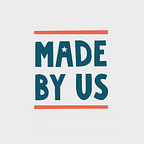Made By Us at SXSW: 1619, 1776, 1866, 2020: The History Wars
How history is battled over today — and where we’re going next
Over the past few years, we’ve watched Confederate monuments topple, public schools get renamed, celebrities get canceled and Juneteenth receive federal recognition. Some have called this moment a “culture war,” but let’s call it what it really is: a fight over how we tell our country’s story — and whose voices are included. How has our understanding of who we are changed as digital spaces and media platforms have grown and siloed? And how do we reckon with polarized perspectives on both sides — when different groups are getting information from vastly different sources? Getting people of all ages engaged in civics and history and widening the lens to include more voices can help us pave the way to knitting our country back together — and possibly change the future of “history” as we know it.
The panel focused on four major questions (above) and kicked off by paraphrasing what the Southern historian John Egerton said about the past: that there’s what happened, what we are told happened, and what we finally come to believe happened. All of these are under fierce debate right now, and always have been, but living in a digital age brings these challenges — and opportunities — to the forefront. Made By Us in particular entered the “history wars” conversation with last year’s pilot of the Civic Season, which unites Juneteenth and July 4th in a season of forward-looking civic action:
Shifts in in the digital landscape and technology has meant that the average person has more power than ever before to self-document their own history; to access history happening in real time (and in the past, through digitized archives); and yet misinformation still reigns. Kelley Fanto Deetz shares her view as a historian:
Unsurprisingly, social media was a major focus. Jason’s book, History Disrupted, chronicles how history has been shared online and how it has changed our perception of the past. He noted the threats that abound when a powerful tool is accessible to powerful people as well as average citizens:
Kahlil works directly in the medium, sharing history to millions of followers on TikTok. As “The Gen Z Historian” he shares the headlines that will capture his generation and works to tell a broader story about history.
Concluding with some suggestions for how we might make things better in the future, Jason suggested taking more history classes. History enrollments have been on the decline at colleges for years, but as Jason said, “if the last history class you took was in 11th grade, I have some news for you: your understanding of American history is probably overly simplistic.” Other panelists pointed out that if a history class is not accessible to you, there are other ways to engage with scholarship, whether on TikTok, following historians on Twitter, visiting museums, exploring archives online, or listening to podcasts.
One question at the end asked the panel how we might find a middle ground in the culture wars — whether that was even possible. Panelists shared some ideas for navigating this space. First, question whether a middle is desirable or whether there’s room for more stories and more space rather than repeating the same narrow narratives that caused the problem in the first place. Second, seek to expand the story you’ve been told by identifying what’s a myth, especially harmful myths, and what’s the more nuanced reality of the story. Third, we can push for better incentives on platforms for quality inclusive content and shift the axis away from one of quick (and monetized) outrage, driving people to deeper engagement.
Questions? Comments? What do you think? Leave a comment here or find us on Twitter to continue the conversation:
